On the Road of Discovery with Systemic Exploratory Constellations: Potentials of Online Constellation Exercises about Sustainability Transitions
Abstract
1. Introduction
2. Theoretical Context: Systemic Exploratory Constellations and Sustainability Transitions
2.1. What Are Exploratory Constellations?
2.1.1. First Order Contingency
2.1.2. Second Order Contingency
2.1.3. Explication
2.2. Sustainability Transitions and Societal Transformation: Moving from Weak to Strong Sustainability Narratives
3. Methods and Research Design
3.1. Research Design of the Online Constellation
3.2. Constellation Format, Process and Data Analysis
4. Findings
4.1. Context A—Germany
4.2. Context B—Portugal
4.3. Participants’ Feedback
5. Discussion: On the Road of Discovery—Emerging New Assumptions and Questions
- (i)
- A strong sustainability narrative does not (necessarily) lead to action and transformation.
- (ii)
- Transformation requires integrating narratives beyond weak and strong sustainability
6. Conclusions—Potentials of (Online) Exploratory Constellations for Sustainability Research
- (1).
- With regard to sustainability transitions and transformations, exploratory constellations constitute an excellent opportunity for interaction between academic and non-academic actors and for exploring together the underlying dynamics for effective structural change. With the support of an experienced constellation facilitator, they can be fruitfully integrated into collaborative and transdisciplinary research;
- (2).
- Constellations are excellent entry points for asking new questions;
- (3).
- Exploratory constellations help develop meta-narratives and can therefore be powerfully combined with narrative research and second order transformation research, or similar approaches.
- (4).
- Online constellations allow a very flexible set-up that can relatively easy bring together not only people from diverse backgrounds, but also from different geographic locations, increasing the interaction between people who otherwise would be confronted with more difficulties or even barriers to meet. Practically, all the advantages of online collaboration apply, with the additional benefit of also exploring together the virtual space from a different perspective;
- (5).
- Online constellations can visualize powerfully questions of significance. One novelty in the online format is that the representatives can not only move around, but change their shape and size, whereas in physical constellations, this would not be possible;
- (6).
- Online constellations offer a constant bird-eye view of the system. Participants as representatives in a constellation exercise can position themselves in the field while continuously being able to see the whole system. Thereby, online constellations provide the unique opportunity for a second order observation, i.e., a self-reflective observation from inside and outside the system at the same time.
Author Contributions
Funding
Institutional Review Board Statement
Informed Consent Statement
Acknowledgments
Conflicts of Interest
References
- IPCC. Global Warming of 1.5 °C. Special Report. 2018. Available online: https://www.ipcc.ch/sr15/ (accessed on 9 December 2020).
- FAO; UNEP. The State of the World’s Forests 2020: Forests, Biodiversity and People, Rome. 2020. Available online: https://doi.org/10.4060/ca8642en (accessed on 9 December 2020).
- United Nations. SDG Report 2020. 2020. Available online: https://unstats.un.org/sdgs/report/2020/ (accessed on 9 December 2020).
- Rauschmayer, F.; Bauler, T.; Schäpke, N. Towards a Thick Understanding of Sustainability Transitions—Linking Transition Management, Capabilities and Social Practices. Ecol. Econ. 2015, 109, 211–221. [Google Scholar] [CrossRef]
- Köhler, J.; Geels, F.W.; Kern, F.; Markard, J.; Onsongo, E.; Wieczorek, A.; Alkemade, F.; Avelino, F.; Bergek, A.; Boons, F.; et al. An Agenda for Sustainability Transitions Research: State of the Art and Future Directions. Environ. Innov. Soc. Transit. 2019, 31, 1–32. [Google Scholar] [CrossRef]
- Groth, T. Organisationsaufstellung—systemtheoretisch angewendet. In Innovative Beratungskonzepte—Ansätze, Fallbeispiele, Reflexionen; Mohe, M., Ed.; Rosenberger Fachverlag: Leonberg, Germany, 2005. [Google Scholar]
- Rosner, S. Systemaufstellung Als Aktionsforschung (Systemic Constellations as Action Research); Rainer Hampp Verlag: Mering, Germany, 2007. [Google Scholar]
- Scholtz, A. Das Potenzial Der Fleischwirtschaft Für Nachhaltigkeit. Eine Beziehungsanalyse Mithilfe von Systemaufstellungen.; LIT Verlag: Vienna, Austria, 2015. [Google Scholar]
- Arnold, M.G. Combining Conscious and Unconscious Knowledge within Human-Machine-Interfaces to Foster Sustainability with Decision-Making Concerning Production Processes. J. Clean. Prod. 2018, 179, 581–592. [Google Scholar] [CrossRef]
- Müller-Christ, G.; Pijetlovic, D. Komplexe Systeme Lesen, Das Potenzial von Systemaufstellungen in Wissenschaft und Praxis; Springer Gabler: Wiesbaden, Germany, 2018. [Google Scholar]
- Bulling, K. The Systems Constellation as an Instrument for Change Agents—A Case Study, General Conceptual Model and Exploration of Intervention Effects; Springer Gabler: Wiesbaden, Germany, 2018. [Google Scholar]
- Ahel, O. Intuition in Management. Möglichkeitsraum, Spannungsfelder Und Emergierende Konstellationen; Springer Gabler: Wiesbaden, Germany, 2020. [Google Scholar]
- Pijetlovic, D. Das Potential der Pflege-Robotik. Eine Systemische Erkundungsforschung; Springer Gabler: Wiesbaden, Germany, 2020. [Google Scholar]
- Kreibich, R. Wissenschaftsverständnis und Methodik der Zukunftsforschung. Z. Für Semiot. 2007, 29, 181. [Google Scholar]
- Rogers, C. Die Klientenzentrierte Gesprächspsychotherapie; Fischer TB: Frankfurt am Main, Germany, 1983. [Google Scholar]
- Weber, G.; Simon, F.B.; Schmidt, G. Aufstellungsarbeit Revisited Nach Hellinger? Mit Einem Metakommentar von Matthias Varga von Kibéd; Carl Auer: Heidelberg, Germany, 2005. [Google Scholar]
- Satir, V.; Banmen, J.; Gerber, J.; Gomori, M. Das Satir-Modell. Familientherapie Und Ihre Erweiterung; Junfermann: Paderborn, Germany, 1995. [Google Scholar]
- Berreth, A. Organisationsaufstellung Und Management. Lesarten Einer Beraterischen Praxis; Carl Auer: Heidelberg, Germany, 2009. [Google Scholar]
- Luhmann, N. Soziale Systeme: Grundriss Einer Allgemeinen Theorie; Suhrkamp Verlag: Frankfurt am Main, Germany, 1984. [Google Scholar]
- Elzen, B.; Geels, F.W.; Green, K. System Innovation and the Transition to Sustainability. Theory, Evidence and Policy; Edward Elgar: Cheltenham, UK, 2004. [Google Scholar]
- Grin, J.; Rotmans, J.; Schot, J. Transitions to Sustainable Development: New Directions in the Study of Long Term Transformative Change; Routledge: New York, NY, USA, 2010. [Google Scholar]
- Olson, R. Houston, We Have a Narrative: Why Science Needs Story; The University of Chicago Press: Chicago, IL, USA, 2015. [Google Scholar]
- Patterson, J.; Schulz, K.; Vervoort, J.; van der Hel, S.; Widerberg, O.; Adler, C.; Hurlbert, M.; Anderton, K.; Sethi, M.; Barau, A. Exploring the Governance and Politics of Transformations towards Sustainability. Environ. Innov. Soc. Transit. 2017, 24, 1–16. [Google Scholar] [CrossRef]
- Hölscher, K.; Wittmayer, J.M.; Loorbach, D. Transition versus Transformation: What’s the Difference? Environ. Innov. Soc. Transit. 2018, 27, 1–3. [Google Scholar] [CrossRef]
- Loorbach, D.; Frantzeskaki, N.; Avelino, F. Sustainability Transitions Research: Transforming Science and Practice for Societal Change. Annu. Rev. Environ. Resour. 2017, 42, 599–626. [Google Scholar] [CrossRef]
- Pereira, L.M.; Karpouzoglou, T.; Frantzeskaki, N.; Olsson, P. Designing Transformative Spaces for Sustainability in Social-Ecological Systems. Ecol. Soc. 2018, 23, 32. [Google Scholar] [CrossRef]
- Abson, D.J.; Fischer, J.; Leventon, J.; Newig, J.; Schomerus, T.; Vilsmaier, U.; von Wehrden, H.; Abernethy, P.; Ives, C.D.; Jager, N.W.; et al. Leverage Points for Sustainability Transformation. Ambio 2017, 46, 30–39. [Google Scholar] [CrossRef] [PubMed]
- Fazey, I.; Schäpke, N.; Caniglia, G.; Patterson, J.; Hultman, J.; van Mierlo, B.; Säwe, F.; Wiek, A.; Wittmayer, J.; Aldunce, P.; et al. Ten Essentials for Action-Oriented and Second Order Energy Transitions, Transformations and Climate Change Research. Energy Res. Soc. Sci. 2018, 40, 54–70. [Google Scholar] [CrossRef]
- Gibbons, L.V. Regenerative—The New Sustainable? Sustainability 2020, 12, 5483. [Google Scholar] [CrossRef]
- Daly, H.E. Elements of environmental macroeconomics. In Ecological Economics: The Science and Management of Sustainability; Constanza, R., Ed.; Columbia University Press: New York, NY, USA, 1991; pp. 32–46. [Google Scholar]
- Hopwood, B.; Mellor, M.; O’Brien, G. Sustainable Development: Mapping Different Approaches. Sustain. Dev. 2005, 13, 38–52. [Google Scholar] [CrossRef]
- Baker, S. Sustainable Development. In Routledge Introduction to Environment Series, 1st ed.; Routledge: London, UK, 2006. [Google Scholar]
- Neumayer, E. Weak Versus Strong Sustainability: Exploring the Limits of Two Opposing Paradigms, 3rd ed.; Edward Elgar Publishing Limited: Cheltenham, UK, 2010. [Google Scholar]
- Michelsen, G.; Adomssent, M.; Martens, P.; von Hauff, M. Sustainable Development—Background and Context. In Sustainabilty Science; Heinrichs, H., Martens, P., Michelsen, G., Wiek, A., Eds.; Springer: Heidelberg, Germany, 2016; pp. 5–29. [Google Scholar]
- Ison, R. Systems thinking and practice for action research. In The SAGE handbook of Action Research, Participative Inquiry and Practice; Reason, P.W., Bradbury, H., Eds.; SAGE Publication: London, UK, 2008; pp. 139–158. [Google Scholar]
- Bryman, A. Social Research Methods, 4th ed.; Oxford University Press: New York, NY, USA, 2012. [Google Scholar]
- Gadamer, H.-G. Truth and Method; Continuum: New York, NY, USA, 2004. [Google Scholar]
- Russell, B. Human Knowledge: Its Scope and Limits; Routledge Classics: New York, NY, USA, 1948. [Google Scholar]
- Evans, J.S.B.T. Bias in Human Reasoning: Causes and Consequences; Lawrence Erlbaum Associates, Inc: Hillsdale, NJ, USA, 1989; ISBN 0-86377-106-8. [Google Scholar]
- Nickerson, R.S. Confirmation Bias: A Ubiquitous Phenomenon in Many Guises. Rev. Gen. Psychol. 1998, 2, 175–220. [Google Scholar] [CrossRef]
- Luhmann, N. Social Systems; Stanford University Press: Stanford, CA, USA, 1995. [Google Scholar]
- OECD. Main Science and Technology Indicators. Available online: http://www.oecd.org/sti/msti.htm (accessed on 11 December 2020).
- BMBF—Bundesministerium fuer Bildung und Forschung. FONA—Forschung Fuer Nachhaltigkeit. Available online: https://www.fona.de/de/ueber-fona/FONA-Strategie.php (accessed on 6 January 2021).
- International Energy Agency (IEA). Germany 2020. Country Report. 2020. Available online: https://www.iea.org/reports/germany-2020 (accessed on 6 January 2020).
- International Energy Agency (IEA). Country Profile: Portugal. Available online: https://www.iea.org/countries/portugal (accessed on 6 January 2021).
- European Environmental Agency (EEA). Trends and Projections in Europe 2020, Luxembourg. 2020. Available online: https://www.eea.europa.eu//publications/trends-and-projections-in-europe-2020 (accessed on 6 January 2021).
- Kahneman, D.; Knetsch, J.L.; Thaler, R.H. Anomalies: The Endowment Effect, Loss Aversion, and Status Quo Bias. J. Econ. Perspect. 1991, 5, 193–206. [Google Scholar] [CrossRef]
- Thaler, R.H.; Sunstein, C.R. Nudge. Improving Decisions about Health, Wealth, and Happiness; Penguin Books: New York, NY, USA, 2009. [Google Scholar]
- Veland, S.; Scoville-Simonds, M.; Gram-Hanssen, I.; Schorre, A.K.; El Khoury, A.; Nordbø, M.J.; Lynch, A.H.; Hochachka, G.; Bjørkan, M. Narrative Matters for Sustainability: The Transformative Role of Storytelling in Realizing 1.5 °C Futures. Curr. Opin. Environ. Sustain. 2018, 31, 41–47. [Google Scholar] [CrossRef]
- Paschen, J.-A.; Ison, R. Narrative Research in Climate Change Adaptation—Exploring a Complementary Paradigm for Research and Governance. Res. Policy 2014, 43, 1083–1092. [Google Scholar] [CrossRef]
- Smith, J.L. I, River?: New Materialism, Riparian Non-Human Agency and the Scale of Democratic Reform. Asia Pac. Viewp. 2017, 58, 99–111. [Google Scholar] [CrossRef]
- Roy, E.A. New Zealand River Granted Same Legal Rights as Human Being. Guardian 2017, 16, 2017. Available online: https://www.theguardian.com/world/2017/mar/16/new-zealand-river-granted-same-legal-rights-as-human-being (accessed on 6 January 2021).
- Luederitz, C.; Abson, D.J.; Audet, R.; Lang, D.J. Many Pathways toward Sustainability: Not Conflict but Co-Learning between Transition Narratives. Sustain. Sci. 2017, 12, 393–407. [Google Scholar] [CrossRef]
- Popper, K. Logik Der Forschung. Zur Erkenntnistheorie Der Modernen Naturwissenschaft; Schriften zur wissenschaftlichen Weltauffassung; Springer: Vienna, Austria, 1935; Volume 9, ISBN 978-3-7091-2021-7. [Google Scholar]
- Runco, M.A.; Albert, R.S. Creativity research: A historical view. In The Cambridge Handbook of Creativity; Cambridge University Press: New York, NY, USA, 2010; pp. 3–19. ISBN 978-0-521-73025-9. [Google Scholar]
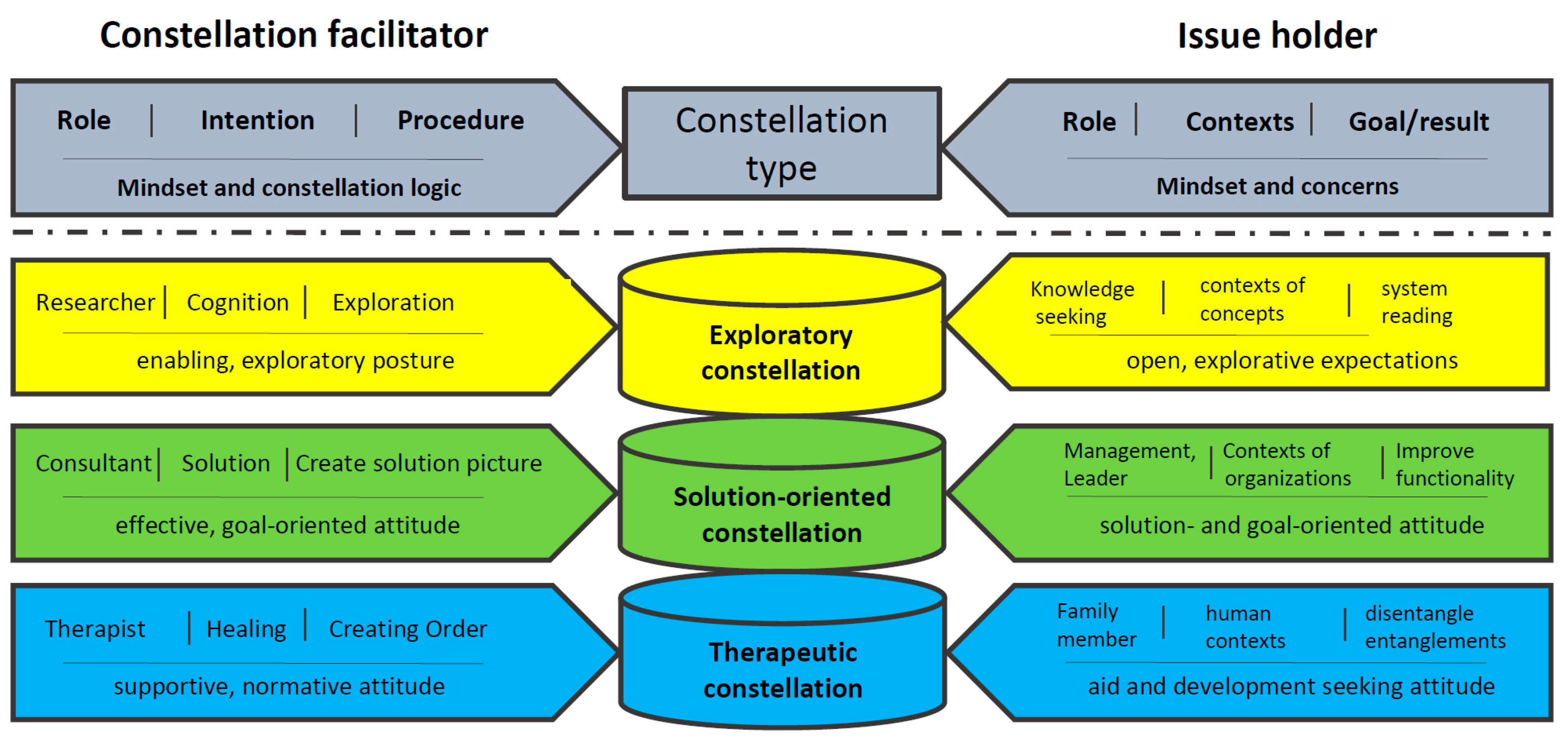
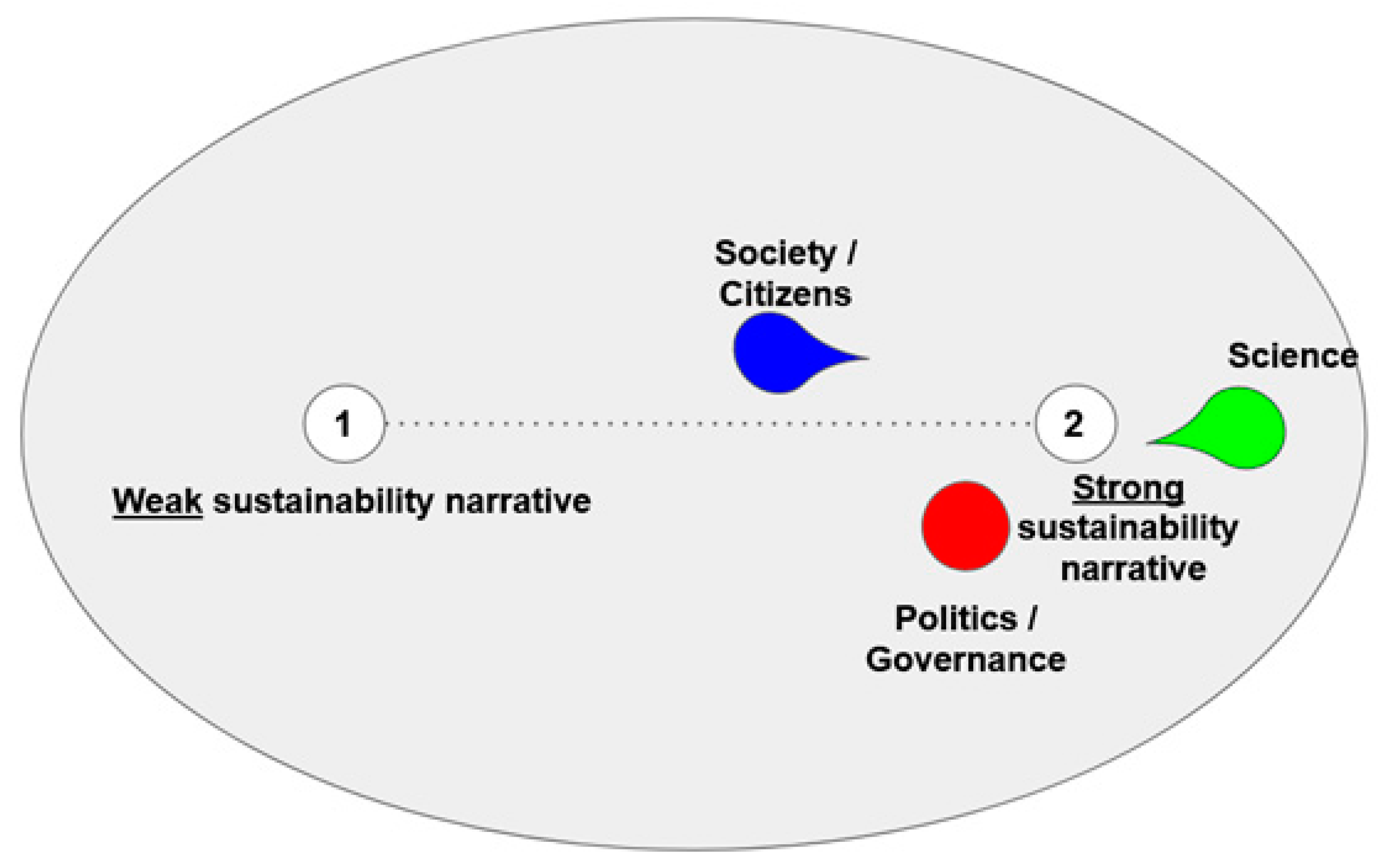
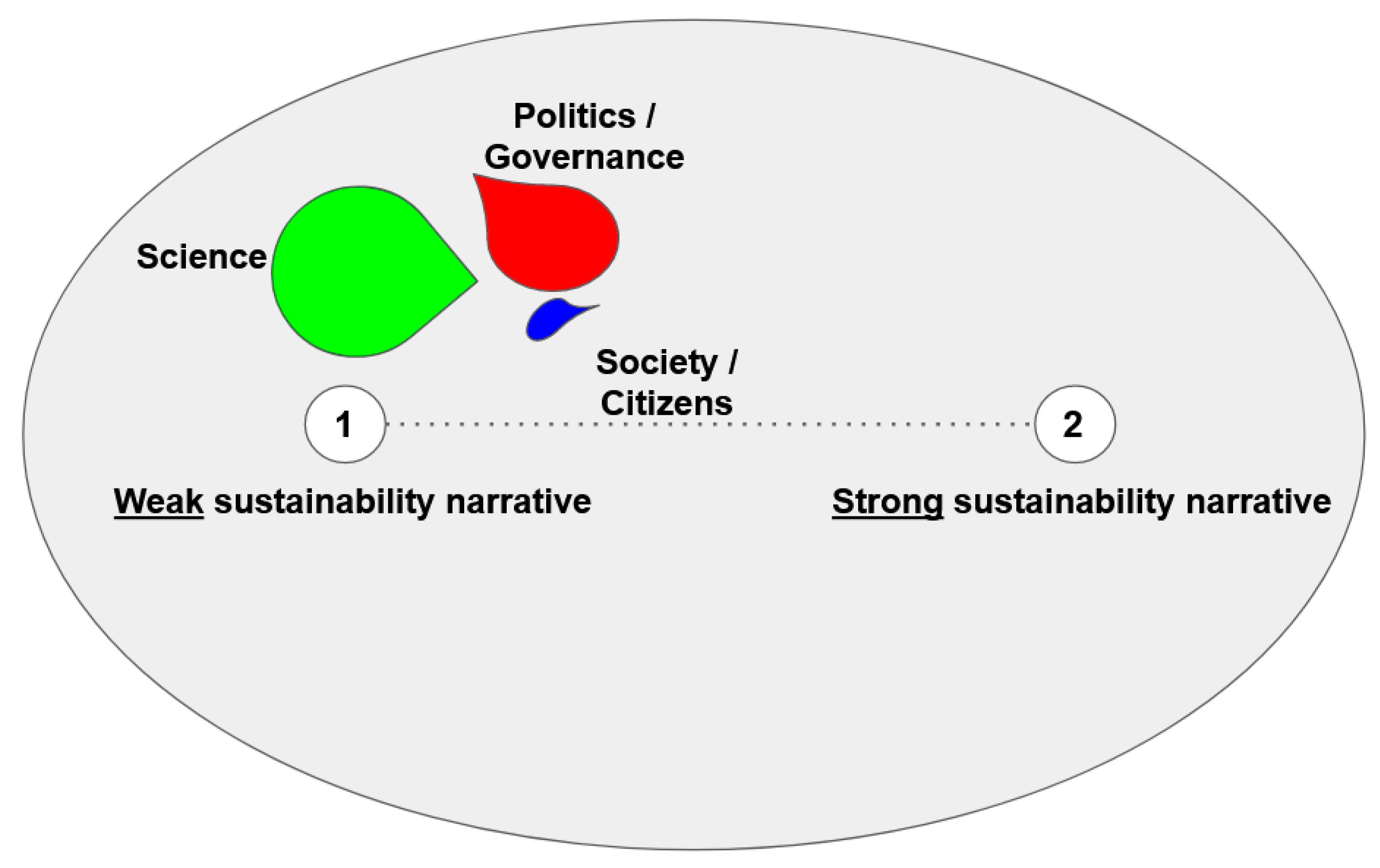
| Topic | Hidden Knowledge about Dynamics in Sustainability Transitions Processes |
|---|---|
| Question/Goal | What are the different needs of selected social actors for a sustainable transformation in Germany and Portugal? > Content-based: system visualizations and new assumptions concerning sustainability transitions and transformation > Method-based: application of online constellation work to derive potentials for virtual collaboration and transdisciplinary sustainability research |
| Constellation | Pre-test and online constellation during International Sustainability Transitions Conference 2020 (IST 2020, Dialogue session 546, http://ist2020.at/dialogue-sessions/ (accessed on 29 April 2021)) |
| Participants | Issue-holders and session hosts: Antje Disterheft and Denis Pijetlovic Facilitator: Antje Disterheft Representatives: three experienced researchers/practitioners as participants of the conference IST 2020 Observers: 11 conference participants for the whole session (14 participants in total, 2 session hosts) |
| Date | 21 August 2020 |
| Duration | 1.5 h (including an introduction and short reflection) |
| Research design | Exploratory research and action research |
| Data collection | Observation, screen shots, field notes, participants’ feedback |
| Data preparation | Protocol, systematization of data, joint reflection |
| Data interpretation | Interpretative-hermeneutic method |
| Instructions for Representatives | Instructions for Observers (Audience) |
|---|---|
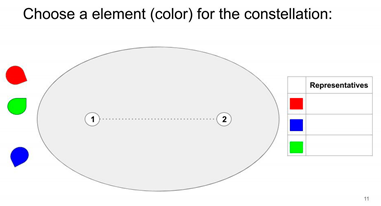 | 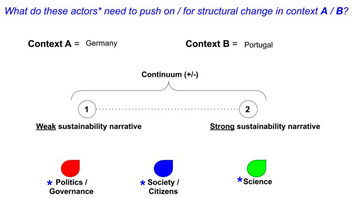 (Note: Image was not visible for the representatives) |
| You are invited to observe the process with an open mind and heart. Please take notes along the process, i.e.,: What seems to be coherent to your (current) understanding or point of view? What is strongly different from your expectations? What causes confusion or confounds you? Coherence feels more pleasant and may comfort us, but confounds, i.e., anything that confuses or surprises us because it is different to what we expected, are interesting and may lead us to some hidden knowledge. |
Publisher’s Note: MDPI stays neutral with regard to jurisdictional claims in published maps and institutional affiliations. |
© 2021 by the authors. Licensee MDPI, Basel, Switzerland. This article is an open access article distributed under the terms and conditions of the Creative Commons Attribution (CC BY) license (https://creativecommons.org/licenses/by/4.0/).
Share and Cite
Disterheft, A.; Pijetlovic, D.; Müller-Christ, G. On the Road of Discovery with Systemic Exploratory Constellations: Potentials of Online Constellation Exercises about Sustainability Transitions. Sustainability 2021, 13, 5101. https://doi.org/10.3390/su13095101
Disterheft A, Pijetlovic D, Müller-Christ G. On the Road of Discovery with Systemic Exploratory Constellations: Potentials of Online Constellation Exercises about Sustainability Transitions. Sustainability. 2021; 13(9):5101. https://doi.org/10.3390/su13095101
Chicago/Turabian StyleDisterheft, Antje, Denis Pijetlovic, and Georg Müller-Christ. 2021. "On the Road of Discovery with Systemic Exploratory Constellations: Potentials of Online Constellation Exercises about Sustainability Transitions" Sustainability 13, no. 9: 5101. https://doi.org/10.3390/su13095101
APA StyleDisterheft, A., Pijetlovic, D., & Müller-Christ, G. (2021). On the Road of Discovery with Systemic Exploratory Constellations: Potentials of Online Constellation Exercises about Sustainability Transitions. Sustainability, 13(9), 5101. https://doi.org/10.3390/su13095101







